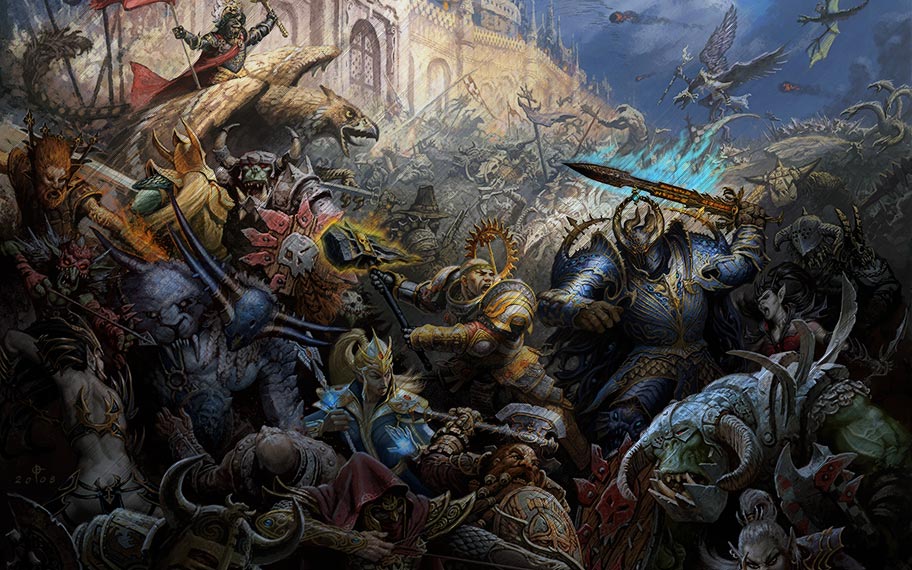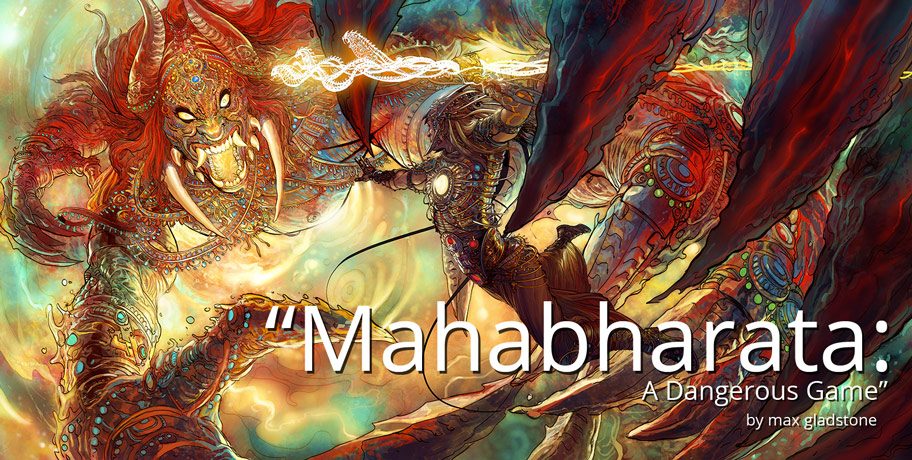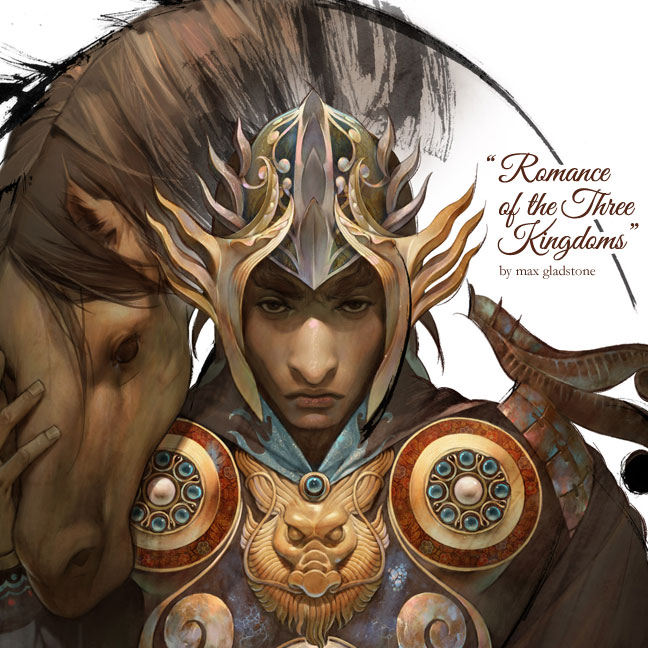Starting with Tolkien, it’s become practically obligatory that the epic fantasy saga, somewhere around the middle of book three, feature an Epic Confrontation Between Good and Evil with a Cast of Thousands.
I am, I have to admit, a war buff. I read military histories for fun, the kind with fold-out maps covered in little colored arrows and notations like “Kollowrath (40,000)”. As I am also a fantasy novelist, the nature of war in fantasy fiction has always been fascinating to me.
And there is a lot of war in fantasy. Starting with Tolkien, it’s become practically obligatory that the epic fantasy saga, somewhere around the middle of book three, feature an Epic Confrontation Between Good and Evil with a Cast of Thousands. Various allies, painfully recruited over the course of the hero’s journey, turn up to lend a hand at the Final Battle. Various villains are dispatched, hapless orcs or equivalent humanoids are mowed down by the score, and just when things seem bleakest Evil is defeated forever. A beloved secondary character or two bites the dust, and someone gets to make a Heroic Sacrifice. Afterward, we may be treated to a scene where the hero roams a battlefield strewn with corpses, or visits the injured to bring home the horrors of combat. You know, war, right?
Back before I wrote fantasy myself, my wargamer friends and I used to snicker a bit at this. Most of the fantasy authors wouldn’t know a halberd from a half-pike, and their descriptions of battles were usually heavy on bold strokes and dramatic confrontations and light on tactics and the important of proper reconnaissance. I wouldn’t want to be a poor foot-slogger in either army, given the rate at which they tend to be chewed up by either the hero and his friends or some villain demonstrating the full extent of his power. Read More »
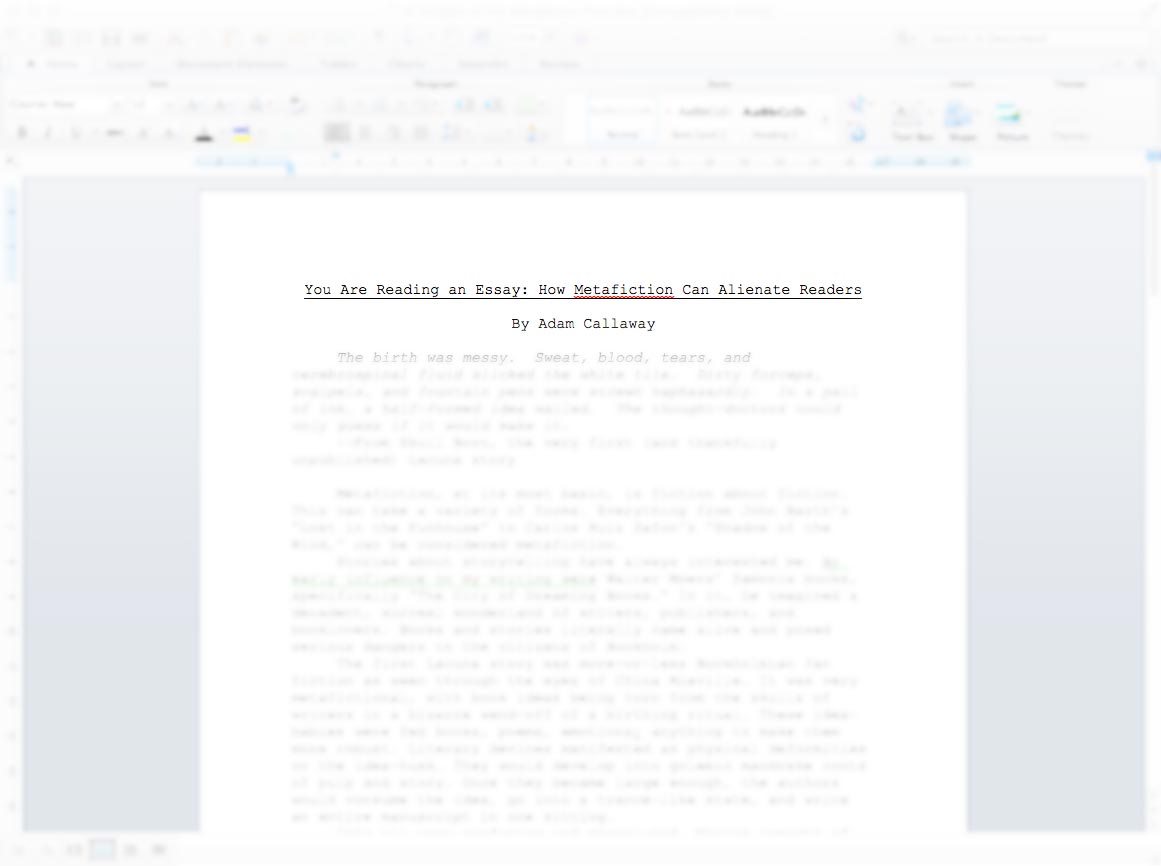
The birth was messy. Sweat, blood, tears, and cerebrospinal fluid slicked the white tile. Dirty forceps, scalpels, and fountain pens were strewn haphazardly. In a pail of ink, a half-formed idea wailed. The thought-doctors could only guess if it would make it.
–From Skull Born, the very first (and thankfully unpublished) Lacuna story
Metafiction, at its most basic, is fiction about fiction. This can take a variety of forms. Everything from John Barth’s Lost in the Funhouse to Carlos Ruiz Zafon’s Shadow of the Wind, can be considered metafiction.
Stories about storytelling have always interested me. An early influence on my writing were Walter Moers’ Zamonia books, specifically The City of Dreaming Books. In it, he imagined a decadent, surreal wonderland of writers, publishers, and booklovers. Books and stories literally came alive and posed serious dangers to the citizens of Bookholm.
The first Lacuna story was more-or-less Bookholmian fan fiction as seen through the eyes of China Mieville. It was very metafictional, with book ideas being torn from the skulls of writers in a bizarre send-off of a birthing ritual. These idea-babies were fed books, poems, emotions; anything to make them more robust. Literary devices manifested as physical deformities on the idea-husk. They would develop into golemic mandrake roots of pulp and story. Once they became large enough, the authors would consume the idea, go into a trance-like state, and write an entire manuscript in one sitting. Read More »
Mahabharata: A Dangerous Game
My enthusiasm and love for these characters and this story will serve for the purpose at hand: encouraging you, dear reader, to immerse yourself in the Mahabharata.
The last two iterations of this column have played it safe. I’ve read Journey to the West in two languages and studied it from a variety of angles, and Romance of the Three Kingdoms, too though to a lesser extent. I could continue in this vein—the next logical essay would be on Outlaws of the Marsh / The Water Margin, China’s great Robin Hood novel and one of Mao Zedong’s favorite books, followed probably by Dream of the Red Chamber for more domestic source material. (Or Jin Ping Mei, if we want to get the sexy-fun-times element in play…)
But while all these stories are great, I’m not as passionate about them as I am about the story I want to discuss now. The problem is, I’m nowhere near as cut out to write this essay as I was the first two—I don’t know the source language, Sanskrit, and I haven’t spent as much time studying the work’s cultural context. (I’m not ignorant, I just don’t have a four year degree, six years of language study, and three years in-country.) There’s also much more chance I’ll do inadvertent harm writing this essay, since the text I’m about to discuss is a live, and lived, religious document in addition to one of the greatest adventure stories, romances, war stories, and apocalyptic tales of all time.
That said, maybe my enthusiasm and love for these characters and this story will serve for the purpose at hand: encouraging you, dear reader, to immerse yourself in the Mahabharata. And I hope that will be worth whatever unintentional harm I do. Read More »
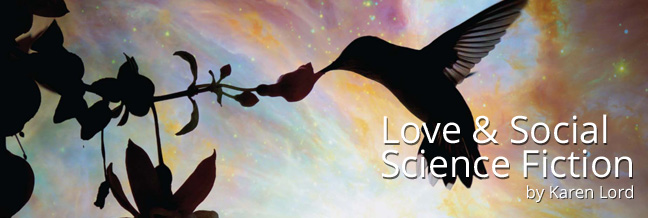
It’s social science fiction, experimenting with questions of power, compromise, dependence and independence, identity and self-determination.
When I started thinking about how to describe The Best of All Possible Worlds, I decided not to call it a romance for two reasons. First, I didn’t think it was a romance. I have a certain admiration for romance writers because they possess a skill set that I don’t have, not yet. I knew that what I’d written lacked the tension and angst and passion I associate with the traditional romance template. Calling it a romance, then doing a bait and switch into Science Fiction, felt dishonest. Second, I couldn’t guarantee there would be any romantic subplots in the sequel (though I also can’t guarantee there won’t be).
Don’t think I’m being polite when I say I admire romance writers. Remember that Sturgeon’s Law applies to all genres. A good, well-written romance is as beautiful and rare as a good, well-written science fiction novel. Even better than both is a blend of genre, a book that can give you a little bit of this and a little bit of that and somehow bring it all together in a very satisfactory, holistic and human way. People fall in love in the future, they encounter mysteries both mundane and uncanny, have adventures, make bad career decisions, experience personal crises and grow – sometimes all at the same time. I don’t mean to suggest this should be all packed in haphazardly like a soap opera, drama piled upon drama for no good reason. There must be order: minor subplots tweaked to reinforce the main plot, characters and situations juxtaposed in ways that create resonance, themes and motifs orchestrated to please and satisfy the subconscious. Read More »
The great old stories break and bend rules modern audiences take for granted. For example: Journey to the West, which I talked about last month, is a story of high-flying magic, transformation, kung fu, divine war, and so on—that, for all its epic scope, reads more like Sword and Sorcery.
That is, to borrow Liz Bourke’s definition of S&S: Journey to the West is a story of encounter, in which central characters going about their daily business keep running into strange, fascinating, terrifying things—and befriending them, or beating them about the head and shoulders, or both.
By contrast, let’s talk about one of the best war-and-intrigue novels of all time, the Romance of the Three Kingdoms. At first glance, Three Kingdoms seems an epic fantasy, in that it describes the fall of a massive empire through the lens of central characters with dynastic ambition. But, though set in a time of miracles, Three Kingdoms relies on the traditional Sword & Sorcery mix of cleverness, combat, and betrayal rather than prophecy or magic. Read More »
